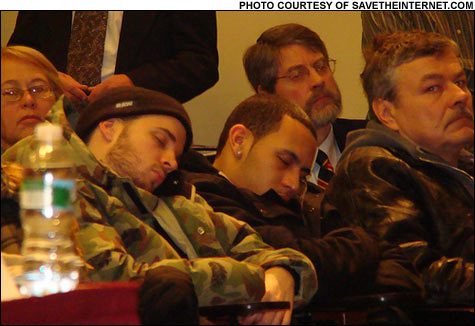
BORED ALREADY? Comcast paid people to fill seats, not to look good or pay attention. |
The Ames Courtroom at Harvard Law School was full past capacity Monday morning. So many people had showed up to attend the Federal Communications Commission's hearing on network neutrality that burly campus cops were posted outside the door, turning dozens of people away.I hung around for a while nonetheless, eventually making my way to another entrance. Peeking into the packed auditorium, I noticed that several people in the front row were sleeping.
This made no sense. The proceedings had just started. On an issue that has so clearly struck a chord with the public, why would anyone that engaged show up early, score a primo seat, and promptly doze off?
We may have an answer. According to savetheinternet.com, a site maintained by a coalition of net-neutrality activists, Comcast "bused in its own crowd. These seat-warmers were apparently paid to fill the room and keep the public out. They arrived en masse some 90 minutes before the hearing began and occupied almost every available seat. . . . One told us that he was 'just getting paid to hold someone's seat.' He added that he had no idea what the meeting was about."
Comcast spokesman Charlie Douglas admits that "just like what happens at a lot of hearings in Washington," there were people paid to stand in line "to hold seats for a couple of the people we knew would be coming" with Comcast executive vice president David L. Cohen. But "everyone knows that this was well-advertised and open to the public. . . . I don't know who might have been sleeping, but we told our employees about the hearing because obviously they have a strong interest in what was discussed there."
So did I. But I was left with little choice but to head home and — thanks to my Comcast high-speed Internet connection — listen to the hearing via streaming Webcast. I got to my apartment just in time to hear Marvin Ammori, general counsel for media reform group Free Press, charge that Comcast was "deliberately targeting and interfering with legal peer-to-peer technology" by blocking BitTorrent software on its network.
Why? Because new-media platforms such as Vuze, which distributes hi-def content via BitTorrent, or Miro, the torrent-based video portal launched by Worcester's Participatory Culture Foundation (PCF), "pose an emerging threat to companies like Comcast, [threatening] their video-on-demand, online video services, and ultimately their cable TV services," Ammori alleged.
Comcast's Cohen — occasionally drawing cheers from sections of the audience — countered by insisting that "reasonable network management practices are essential to promoting broadband deployment." All Comcast users can download video from Vuze, BitTorrent, eDonkey, or any other application, he insisted.
But, pointing out that "bandwidth consumption is a real concern across the Internet," he admitted that "it's true, to maximize our customers' Internet experience, we do manage our network. One tool that we use manages certain p2p uploads at certain times. We do this in a very limited manner, designed to have a minimal, virtually imperceptible effect on a small number of users."
Yes, says PCF's Dean Jansen, "certain types of network management are necessary." But "there's a right way to do it and a wrong way to do it." Comcast's technique — essentially impersonating the host at the end of a BitTorrent transaction and terminating the connection — would seem to be the latter. "One of the [panelists] from MIT said that basically Comcast is using hacker techniques."
"Our mission is to support independent creators and open media," says Miro co-creator Nicholas Reville. "One of the best ways that independent creators can reach an audience with high definition video — without huge bandwidth costs — is through BitTorrent. When companies like Comcast are blocking BitTorrent, they're blocking free speech, they're shutting down competition from independent creators, and they're putting up a needless barrier for independent voices to reach an audience."
The good news is that the FCC seems to get it. "While networks may have legitimate network issues and practices, that does not mean that they can arbitrarily block access to certain network services," said FCC chairman Kevin Martin. "The commission is ready, willing and able to step in if necessary to correct any practices that are ongoing today."
It's been noted that Comcast's BitTorrent management techniques are similar to those used by the infamous "Great Firewall of China." Is this on that scale? No. But America likes to advertise itself as a model of open and free society. We should want our Internet to reflect that.
For more information, visit savetheinternet.com and freepress.net.